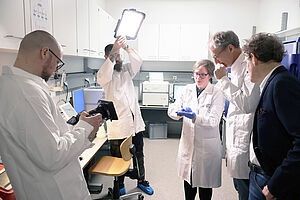The Molecular Diagnostics team of the AIT Center for Health and Bioresources is working together with MedUni Vienna and domestic high-tech partners on a groundbreaking method to diagnose cancers significantly faster and less invasively. With screen-printed electrochemical biochip sensors, DNA point mutations (“point mutations”) can in future be identified directly from a simple blood sample—instead of a time-consuming tissue extraction and analysis.
Lengthy biopsies delay therapy start
In current cancer diagnostics, tissue extraction often requires invasive procedures, lengthy sample preparation and elaborate laboratory processes, so that it can take weeks before the DNA is evaluated for disease-relevant mutations—time that, in aggressive tumor forms, can mean the difference between life and death. In addition, the sample logistics—cooled storage at –80 °C and specialized laboratories, usually in large clinics—pose a major challenge for comprehensive coverage.
Life-saving time gains through biochips
In the national funding project NanoPredict, AIT, MedUni Vienna and partners such as RHP-Technology and Attophotonics are developing an easy-to-use diagnostic chip that can be deployed directly on-site by medical personnel. From a blood sample, the tiny DNA fragments originating from the tumor cells and containing the point mutations typical of breast cancer are first amplified. The sample is then applied to the printed biosensor at exactly 55 °C, where the breast cancer–specific DNA is detected. Altogether, this biochip enables a rapid and precise diagnosis within a few hours. Eva Melnik, Senior Scientist AIT Molecular Diagnostics: “We analyze directly from blood samples and identify point mutations within a few hours—compared to conventional methods, which can take weeks. That saves valuable time and makes invasive biopsies unnecessary.”
Bridge to personalized medicine
The biochip sensors are currently manufactured in a Lower Austrian high-tech facility in Seibersdorf. Within the next six years, the technology could become market-ready and decentralize cancer diagnostics—directly in doctors’ offices or mobile health stations. Moreover, it will enable continuous monitoring of tumor DNA during therapy, allowing treatment adjustments to be made in real time.
By employing biosensor technology, AIT closes the gap between cutting-edge nanotechnology and clinical routine, paving the way for personalized, rapid and gentle tumor diagnostics.
Link to ORF ZIB segment: https://on.orf.at/video/14276585/zib-magazin-vom-20052025
NanoPredict (FFG): https://projekte.ffg.at/projekt/4641713/pdf



